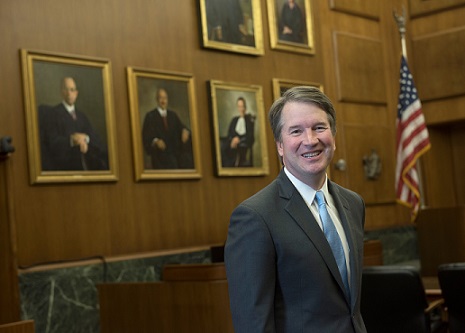Indicted Russian company cites Kavanaugh opinion on campaign finance in bid to get charge tossed

Judge Brett Kavanaugh. Photo by U.S. Court of Appeals for the District of Columbia Circuit.
An indicted Russian company accused of taking part in an “information warfare” campaign to influence the 2016 presidential election is citing an opinion by Supreme Court nominee Brett Kavanaugh in a bid to get the charge dismissed.
Concord Management and Consulting, indicted in February by special counsel Robert Mueller, says its issue advocacy is consistent with Kavanaugh’s 2011 decision in Bluman v. Federal Election Commission, the Washington Post reports. Concord, which is charged with conspiracy to defraud the United States, is among 13 Russian nationals and three Russian groups accused of trying to influence the election.
Concord is accused of paying $1.25 million a month to the Internet Research Agency, a Russian company, to set up political rallies and create false social media accounts, with the aim of sowing discord and influencing the election.
Kavanaugh wrote Bluman for a panel of the U.S. Court of Appeals for the D.C. Circuit. His opinion upheld a federal law barring foreign nationals temporarily in the United States from donating money to candidates, political parties, and groups advocating for or against candidates. The Supreme Court later upheld the D.C. Circuit in a brief order.
Kavanaugh wrote a narrow opinion that rejected the First Amendment challenge of two foreign nationals who wanted to support particular candidates. Though Kavanaugh said the law bars express advocacy by the foreign nationals, he noted that the law does not bar them from issue advocacy.
Kavanaugh said the Supreme Court had never squarely addressed the issue, but four dissenting justices in Citizens United v. Federal Election Commission had believed that the government may bar foreign contributions and expenditures. Citizens United is the January 2010 decision that held corporations have a First Amendment right to expressly support political candidates. Though justices in the Citizens United majority didn’t address the foreign national issue, their opinion “is entirely consistent with a ban on foreign contributions and expenditures,” Kavanaugh said.
Kavanaugh said his decision had three important limits:
- The opinion doesn’t decide whether Congress could extend the ban to foreign nationals who are lawful permanent residents.
- The decision doesn’t decide whether Congress could ban other types of advocacy by foreign nationals.
- The statute’s requirement that a defendant act “willfully” before imposition of criminal penalties “will require proof of the defendant’s knowledge of the law.”
Concord cites Kavanaugh’s distinction between issue ads and ads that back a candidate. Its lawyers write: “Foreign nationals are not barred from issue advocacy through political speech such as what is described in the indictment—they are only precluded from willfully making expenditures that expressly advocate the election or defeat of a particular candidate.”
Though Kavanaugh referred to Citizens United dissenters, his campaign finance philosophy in Bluman and other cases “appears to fit comfortably” with the conservative majority’s support for the First Amendment in campaign finance cases, according to the Post.
He joined in one March 2010 decision, SpeechNow.org v. FEC, that struck down limits on contributions to independent advocacy groups. Coverage at the time said the en banc decision “significantly broadens the impact of Citizens United.” According to the Post, the decision led to super PACs that can collect unlimited sums of money.



